This afternoon, I finished reading Jonathan Dimbleby’s excellent history, ‘The Battle of The Atlantic’, the story of a series of ocean conflicts that occupied the best part of the Second World War. Having been born in 1942, I unwittingly, along with the rest of us at home, bore the consequences of the shortages of basic living requirements for a good decade after Victory in Europe Day three years later. But I kept my life. Unlike those many thousands of sailors of the Royal Navy and the Merchant Marine; not forgetting the German crewmen, who died such terrible deaths in the struggles to supply the Allies.
Dimbleby has written a thoroughly engaging book detailing not only the political and strategic decisions of the combatants, but also the horrors of the battles, and the effects on the lives of civilians ashore.
The author’s concentration on the conditions endured by both the merchant seamen and the enlisted crew-members brings home to the reader the horrific nature of those years at sea. His description of the consequences of the severe weather on navigation and the impossibility of prolonged survival in the water makes the scenes in and around the lifeboats in the film ‘Titanic’ seem like coping with a capsized pleasure craft in a municipal boating lake. It had, for example, never occurred to me that the vessels on the Arctic convoys could become so iced up that the weight of the frozen water on deck would be capable of sinking a ship.
Sam, after his solo Atlantic row, told us how the waves could toss his little boat considerable distances through the air. Dimbleby describes much larger vessels being given similar treatment.
Since the last few negatives of our March 2004 visit to Barbados are of the Atlantic’s multicoloured waves, albeit in the shelter of the Barbados shore, it seemed appropriate for me to scan them for today’s illustrations.
Tonight we dined on Jackie’s excellent chilli con carne and savoury rice, followed by treacle and apple tarts with thick cream.


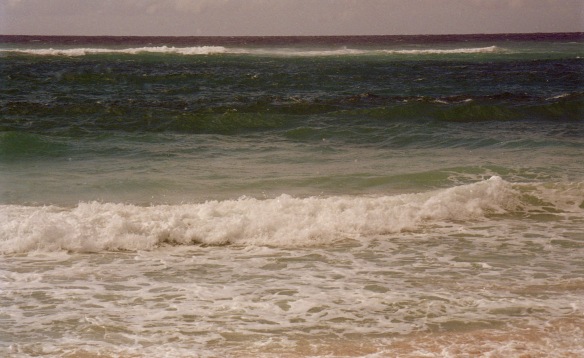
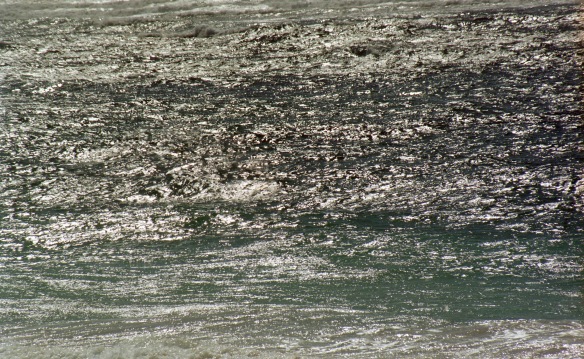
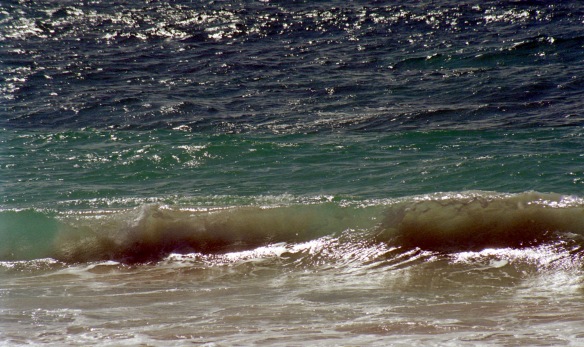

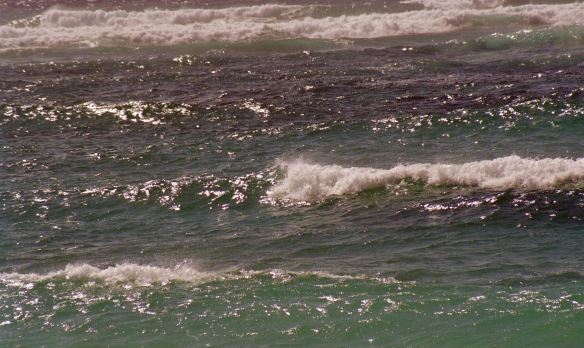
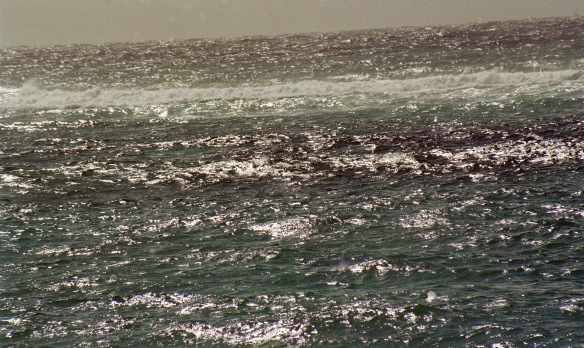
Learned a new word today: treacle. Thanks. 🙂
http://www.bbc.co.uk/food/recipes/mary_berrys_treacle_tart_28524 Thanks, Johnna
The photos complement very well the thorough review Derrick 🙂
Many thanks, Sylvie
What’s treacle, Derrick? You chose the perfect photos to accompany your review.
http://www.bbc.co.uk/food/recipes/mary_berrys_treacle_tart_28524 Thanks, Jill
Thanks!
Great review and the angle of the last wave shot makes it look like a Tsunami! Eeek! Treacle, it appears, may not be commonly known in the US………. I think it’s disappeared from here too.
Thanks, Pauline. I’m glad you noticed the last shot, which I chose not to straighten
I had to look “treacle” up. It sounds like a syrup? My mom was from York, PA – Pennsylvania Dutch – and she grew up with King’s Syrup. I forget what she put it on, but it would have been lovely on an apple tart!~
Syrup it is, Jodie. Thanks
Waves are rhythmic and mesmerizing, then they also can become powerful and dangerous, Derrick. This was a great and informative post.
Many thanks, Robin
Lovely pictures to complement the extensive review… 🙂
Thank you, Maniparna
I think we often forget what it must have been like to sail in dangerous seas of all sorts, and we here in the US, don’t always remember or know what it was like during and after WWII for people in the UK, Germany, and other parts of the world.
Thanks, Merril. One amazing section in the book describes how the public were so intent on carrying on their normal lives that America’s east coast was lit up at night, so the U-boats were able to pick off their visible prey at will
I took some exchange students (from USA) on the harbour once; they’d never seen the sea before coming to Sydney and were overwhelmed. The sea can seem ominous even on a calm day; I know because I never learnt to swim though I have lived near water all my life.
It’s disappointing that after thousands of years of civilisation, human beings are still behaving like savages. It makes me wonder if war is ingrained and indelible in men. The only lessons they’ve ever taken from war is a disregard for other human beings and a thirst for their destruction on any pretext. I wonder how many lives, families and homes were destroyed in the time you read that book. I wonder what Dimbleby would think if he knew that our navy (Australian) is being used for keeping refugees from our shores, so they can drown outside of our waters.
Thank you, Mary. An awful reflection on modern times, and how little our leaders learn from history. It is even more amazing when one considers that Australia was founded on refugees.
That’s a fact that certain people here would never acknowledge. 🙁
The book sounds excellent. Do you feel that you have suffered long-term effects from deprivation because of being born during wartime?
Thanks, Luanne. Not at all. No-one had anything, so, although quite poor, we were just like everyone else. On the contrary, it taught us to value what we did have, and to appreciate what our parents did with so very little
So wonderful that you were able to take the positive out of it. I have a friend who is French who says she thinks her health was affected by having so little healthy food when she was so little.
It was perhaps more difficult for the French, who were occupied
The ocean has many moods, and colors, to which your excellent photos attest.
“treacle.” though it was not a real thing in my early life, was a thing that often appeared in books…and I always imagined it as something very sweet….
I always imagine treacle as sorghum…yum. But it’s probably not. My father was in the navy in the Pacific in WWII. Uncles were in various places from Kunming China to North Africa to the Atlantic and London. One could talk firsthand about the Murmansk run and yes, he said the waters were hideously cold. My father didn’t talk much about his experiences, but he did mention the hugeness of the waves at sea and the way the ship would behave in them. He took some beautiful photographs in New Guinea. Thanks for the review. I had no idea of the ice on deck issue!
Thanks, Lisa. I hadn’t known about the Arctic convoys at all. There is a photo in the book which shows a deck looking like ice sculpture. My Dad, incidentally, was at Dunkirk, and his Dad taught flying in WW1
I remember your blog on the airplane in the museum. Did your father get back during the transport?
He did. In a leaky fishing boat, when he couldn’t swim. Thanks for asking
Glad to hear it. My mother never learned to swim either–and was always out in canoes with my father–with a life jacket on.
I hope our library has the book. I like it a lot when you say what books you’re reading, what you’re eating and drinking. Isn’t that weird?
Thanks, Weekly. I hope to cater for all tastes, but it is just days in my life.
Oh, I know. I was just saying that it’s nice to hear what you’re reading (esp because I try to check the books out for myself) and for some weird reason, maybe because you always do it, it’s good to hear/see what you’re having for dinner. But yeah – don’t cater. That would be the beginning of the end 😉
Thank you for the review Derrick. Sounds like a harrowing read!
The photos are very apt!
Thanks, Danella. Serendipity that I came across the negs so recently
I watched his two programme series about North Africa and that was extremely good too. His father of course, bravely went on quite a few Bomber Command raids over Germany as a reporter. Quite extraordinary courage!
Thanks, John.
An interesting post Derrick with great photos to match.
Thanks, Miriam
I wonder if some of the problems we see in our modern lives in UK US Aust et al is because as nations we have forgotten the price that was paid for our freedom.
Absolutely, John. Thanks
It is so easy to think of the so called glories of war (can there really be any?) and forget the horror and tragedy of each day. Thanks for the review
Thanks, Laurie
Very nice Derrick and wonderful compliment with the photos!
Thanks, Lynn
most welcome!
Sounds like a good read – there was a documentary on tv about it a yr or 2 ago, done by none other than Jeremy Clarkson, best thing he ever did, with personal stories and archive footage, not the first time I shared this link, an amazing bit of history! https://vimeo.com/95372252
Many thanks, Ogden.
One of the fellows living in our complex is in his late eighties and was in the merchant navy. He doesn’t talk a lot about it, but if asked directly will tell you. He ended up in the drink at least twice I think during WWII.
Thanks, Gwen. I’m glad he made it through
Interesting post! The ocean, though beautiful, can be terrifying. I have a friend—an American— who went to school in England after the war, and she has told me that because she was under a certain age—18?—she was allowed an orange a week. Does that fit with your recollections?
An orange a week!! I didn’t know we had any. But that may have been a ration my parents couldn’t afford. We still used ration books for things like clothes and sweets well into the ’50s.
Yes, my friend was at a school, so no doubt things were different than they would have been in a home. It overwhelms me to think of the destruction brought about by the Second World War and how it rippled forward so many years later.